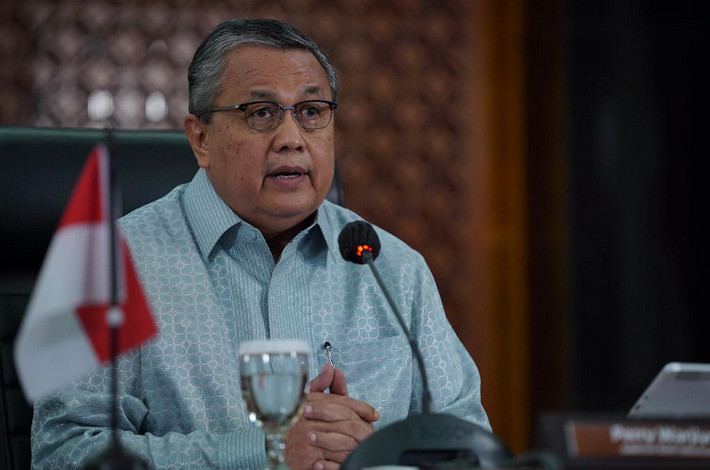Popular Reads
Top Results
Can't find what you're looking for?
View all search resultsPopular Reads
Top Results
Can't find what you're looking for?
View all search resultsBI trims rate to record low for economic recovery
Central bank governor aims for low inflation, stable rupiah
Change text size
Gift Premium Articles
to Anyone
B
ank Indonesia (BI) has cut its benchmark interest rate for the sixth time since COVID-19 struck Indonesia, bringing it to a record low in an attempt to support the economic recovery.
Thursday’s decision brings the central bank’s seven-day reverse repo rate down 25 basis points (bps) to 3.5 percent, the lowest level since the rate was introduced in 2016. The bank last cut its rate in November last year.
BI also lowered the deposit facility rate by 25 bps to 2.75 percent and the lending facility rate by 25 bps to 4.25 percent following its two-day policy meeting. The benchmark rate will affect banks’ savings and loan interest rates, as well as bond yields.
“This decision is consistent with our projected low inflation and stable rupiah exchange rate and to push economic recovery,” BI Governor Perry Warjiyo said during a press conference broadcasted on YouTube.
Indonesia’s annual inflation rate slowed in January to 1.55 percent year-on-year (yoy), the lowest since November 2020, as job losses, business closures and mobility restrictions limited consumers’ purchasing power, Statistics Indonesia (BPS) data shows. The rate was also below Bank Indonesia's target range of 2 to 4 percent for this year.
Meanwhile, the rupiah has recovered to around Rp 14,000 against the greenback so far this year, up from Rp 16,000 in March 2020, the lowest rate since the 1998 Asian financial crisis.
The country plunged into an economic recession last year for the first time since 1998, with the GDP dropping by 2.07 percent as most economic components fell.
The central bank delivered five rate cuts worth a total of 125 bps in 2020 to cushion the impact of the coronavirus pandemic and encourage economic activity. It has also taken quantitative easing measures, including buying government bonds, cutting the reserve requirement ratio and undertaking monetary expansion.
Bank Indonesia has lowered its economic growth projection for Indonesia to between 4.3 percent and 5.3 percent for 2021, down from its previous projection of between 4.8 percent and 5.8 percent. The projection now exactly matches the government’s, which was also recently revised down from an initial forecast of growth between 4.5 percent and 5.5 percent.
BI’s Perry attributed the lower projection to lower-than-expected consumption and property investment in last year’s fourth quarter amid continued mobility restrictions in Indonesia.
Household spending fell 2.63 percent last year, led by a decline in retail sales.
“Going forward, economic recovery will happen as the global economy recovers and as the government accelerates the national vaccination program,” he said.
BI expects the world economy to recover 5.1 percent this year, higher than the previous projection of 5 percent, with China and India leading the recovery among developing countries, including Indonesia.
BI also revised down its domestic loan disbursement growth projection for this year to between 5 percent and 7 percent from the initial estimate of between 7 percent and 9 percent.
The central bank based the new estimate on the banking industry’s high average capital adequacy ratio (CAR) of 23.8 percent and low nonperforming loan (NPL) ratio of 3.1 percent as of December 2020. The former figure measures banks’ financial strength.
Banks’ loan disbursements contracted by 1.92 percent year-on-year (yoy) in January 2021, which compares to a contraction of 2.41 percent yoy in December 2020.
Governor Perry said the central bank would continue its quantitative easing policy to help the government finance its stimulus programs and to spur lending.
Bank Indonesia bought Rp 473.42 trillion worth of government bonds in 2020 as part of the burden-sharing agreement with the government.
The pandemic has spurred government spending and sapped tax revenue. The country aims to spend Rp 627.9 trillion in national economic recovery (PEN) funds in 2021, compared to Rp 695.2 trillion last year.
Bank Central Asia (BCA) chief economist David Sumual said Bank Indonesia’s decision to lower its benchmark interest rate was within expectations, also because of the country’s relatively controlled inflation rate and the strengthening rupiah exchange rate.
“There was still room to lower rates, but now it is very limited. It will likely remain flat this year,” he told The Jakarta Post via phone call.
He added that the lower benchmark rate would complement other government measures to expedite economic recovery. These included tax breaks, eased trade regulations, social safety nets and the country’s COVID-19 vaccination program.
The University of Indonesia's Institute for Economic and Social Research (LPEM UI) previously recommended that the central bank lower its benchmark rate this month to 3.5 percent to accelerate economic recovery in the first half of this year.
The institute wrote in a February research note that such a cut would help stimulate internal demand and stabilize prices while external conditions “show a glimmer of hope” as the country records substantial portfolio inflows, monthly trade surpluses and foreign exchange reserves.
“We believe the option to further cut the policy rate is better than to hold in the hope that it can kick-start economic activity faster instead of facing a delay in economic recovery,” reads the report.










